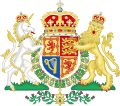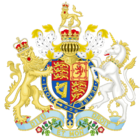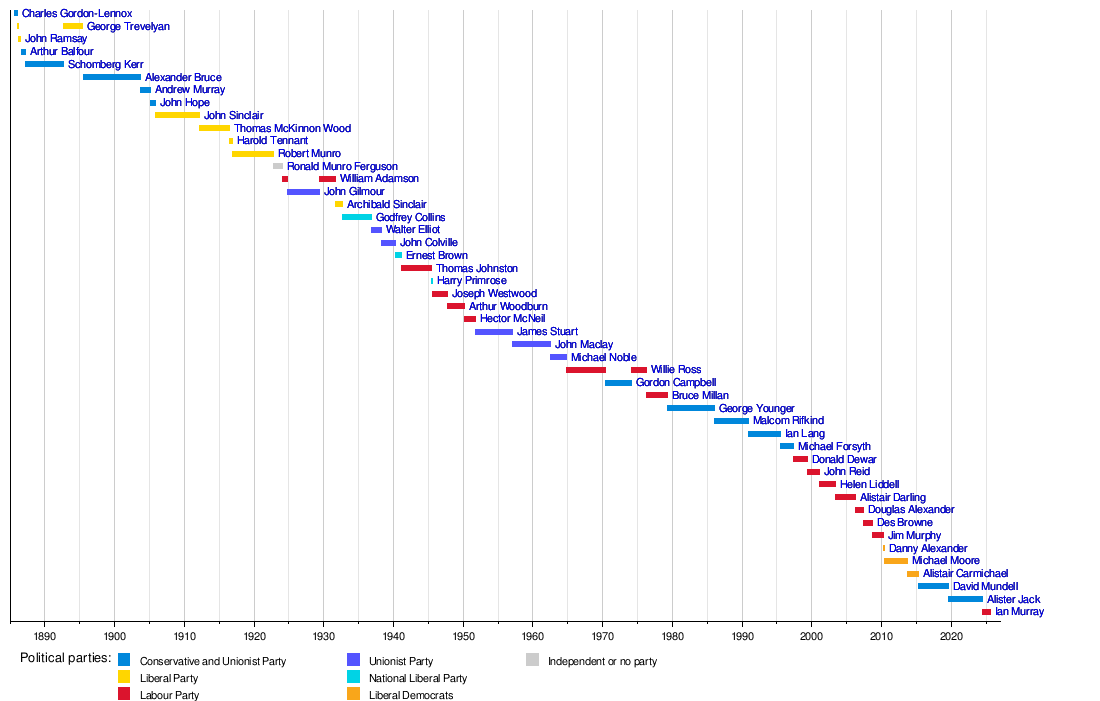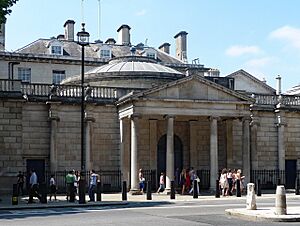Secretary of State for Scotland facts for kids
Quick facts for kids Secretary of State for Scotland |
|
|---|---|

Royal Arms of His Majesty's Government in Scotland
|
|
| Office of the Secretary of State for Scotland | |
| Style | Scottish Secretary (informal) The Right Honourable (within the UK and Commonwealth) |
| Member of | |
| Reports to | The Prime Minister |
| Seat | Westminster |
| Nominator | The Prime Minister |
| Appointer | The Monarch
(on the advice of the Prime Minister)
|
| Term length | At His Majesty's pleasure |
| Formation |
|
| Deputy | Parliamentary Under-Secretary of State for Scotland |
| Salary | £159,038 per annum (2022) (including £86,584 MP salary) |
| Website | Scotland Office |
The Secretary of State for Scotland (also known as the Scottish Secretary) is an important government job in the Government of the United Kingdom. This person is in charge of the Scotland Office. The Secretary of State for Scotland is also a member of the Cabinet of the United Kingdom, which is a group of the most important ministers in the government.
This role helps make sure that the rules for Scottish devolution (where Scotland has its own parliament and government) are followed. The Secretary also speaks up for Scotland's interests within the UK Government. They also explain the UK Government's plans in Scotland. Another key part of the job is to help the UK Government and the Scottish Government work together. They also manage the relationship between the UK Parliament and the Scottish Parliament.
Many of the Secretary of State for Scotland's duties moved to the First Minister of Scotland when the Scottish Parliament started in 1999. This happened after the Scotland Act 1998 was passed. The person in this job works with other ministers in the Scotland Office. The Secretary is helped by their deputy, the Parliamentary Under-Secretary of State for Scotland. The current Secretary is Ian Murray. He was chosen by Prime Minister Keir Starmer in July 2024.
Contents
Understanding the Role of Scottish Secretary
How the Job Started
From 1707 to 1746
The job of Secretary of State for Scotland was first created in 1707. This was after the Acts of Union 1707 joined the Kingdom of England and the Kingdom of Scotland to form the Kingdom of Great Britain. However, the job was stopped in 1746 after a rebellion called the Jacobite rising of 1745. After that, Scottish matters were handled by the Lord Advocate. Later, in 1827, the Home Office took over these duties.
The Job Returns in 1885
In 1885, the job was brought back as "Secretary for Scotland." The person in this role was usually part of the Cabinet of the United Kingdom. Then, in 1926, the job was made even more important. It became a full "Secretary of State" position.
Changes After 1999
After Scotland gained more power in 1999, the role of the Secretary of State for Scotland changed a lot. This is known as "devolution." Most of the powers that the Scottish Office used to have were given to the new Scottish Government or to other UK government departments. This left the Scotland Office with a smaller role. For a few years, from 2003 to 2008, the Secretary of State for Scotland also held another Cabinet job at the same time. Some people thought this meant the Scottish role was not a full-time job.
What the Secretary Does Now
Fewer Direct Responsibilities
When Scotland got its own parliament in 1999, the Secretary of State for Scotland's direct power became less. Many of the duties moved to the new Scottish Ministers. The First Minister of Scotland took over most of the powers. Donald Dewar was the first First Minister of Scotland from 1999 to 2000. Before that, he was the Secretary of State for Scotland from 1997 to 1999.
However, the Secretary of State still represents Scotland in the UK Cabinet. This is for things that the Scottish Parliament does not control. They also hold "Scotland Questions" every month. During this time, any Member of Parliament can ask questions about Scotland. But they usually don't ask about things that the Scottish Government handles. This is because those decisions are made in Edinburgh by members of the Scottish Parliament. The Secretary of State also cannot introduce new laws in the UK Parliament about things that Scotland's government controls. This is a rule to respect Scotland's own parliament. The Secretary of State also leads the Scottish Members of Parliament from the government's party.
Working with the Scottish Government

The Secretary of State mainly acts as a link between the UK and Scottish Governments and Parliaments. Because the Secretary is a minister in the UK government, they must support the UK government's decisions. This means their job is often seen as promoting the UK government's views in Scotland.
The role of the Secretary of State has become more important as the Scottish National Party (SNP) has grown. The SNP wants Scotland to be independent. The Scotland Office has also received more money in recent years.
Main Duties
The UK government website lists the Secretary of State for Scotland's main duties:
- They are the UK Government Cabinet Minister who represents Scotland.
- They make sure the rules for Scotland's self-governance are kept.
- They speak for Scotland's interests within the UK Government.
- They explain the UK Government's plans in Scotland.
- They also help the UK Government and the Scottish Government work together. They also manage the relationship between the UK and Scottish Parliaments.
The UK Government says that all Cabinet ministers who have a role like the Secretary of State for Scotland are responsible for:
- Making sure that the way power is shared with Scotland works well. They are a key link between the Scottish Government and the UK Government.
- Dealing with laws that affect Scotland.
- Representing Scotland's interests in Cabinet meetings.
- Answering questions from Parliament about Scottish matters.
- Sending money (called a "block grant") to the Scottish Government.
- Helping the UK Government and the Scottish Government work together.
- Promoting Scotland's interests.
People Who Have Been Scottish Secretaries
Secretaries of State for Scotland (1707–1746)
John Erskine, Earl of Mar was the Secretary of State for independent Scotland from 1705. After the Acts of Union 1707, he stayed in the job.
The job of Secretary of State for Scotland existed from the Union in 1707 until the Jacobite rising of 1745. After the rebellion, the Home Secretary was mainly in charge of Scotland, often through the Lord Advocate.
| Secretary of State | Term of office | ||
|---|---|---|---|
 |
John Erskine Earl of Mar |
(since 1705) 1 May 1707 |
3 February 1709 |
 |
James Douglas 2nd Duke of Queensberry |
3 February 1709 |
6 July 1711 |
 |
John Erskine Earl of Mar |
9 September 1713 |
24 September 1714 |
 |
James Graham 1st Duke of Montrose |
24 September 1714 |
August 1715 |
 |
John Ker 1st Duke of Roxburghe |
13 December 1716 |
August 1725 |
 |
John Hay 4th Marquess of Tweeddale |
25 February 1742 |
3 January 1746 |
The job was then empty for a long time.
Secretaries for Scotland (1885–1926)
| Secretary for Scotland Act 1885 | |
|---|---|
| Act of Parliament | |

|
|
| Long title | An Act for appointing a Secretary for Scotland and Vice-President of the Scotch Education Department. |
| Citation | 48 & 49 Vict. c. 61 |
| Dates | |
| Royal assent | 14 August 1885 |
|
Status: Amended
|
|
| Text of statute as originally enacted | |
| Text of the Secretary for Scotland Act 1885 as in force today (including any amendments) within the United Kingdom, from legislation.gov.uk | |
The Secretary for Scotland was the main minister in charge of the Scottish Office in the UK government. The Scottish Office was created along with this job by the Secretary for Scotland Act 1885. From 1892, the Secretary for Scotland was part of the Cabinet. In 1926, this job was made into the full Secretary of State for Scotland.
From 1885 to 1999, Secretaries for Scotland also held the job of Keeper of the Great Seal of Scotland. Since 1999, the First Minister of Scotland has held this position.
| Secretary of State | Term of office | Party | Ministry | ||||
|---|---|---|---|---|---|---|---|
 |
Charles Gordon-Lennox 6th Duke of Richmond |
17 August 1885 |
28 January 1886 |
Conservative | Salisbury I | ||
 |
George Trevelyan MP for Hawick Burghs |
8 February 1886 |
March 1886 |
Liberal | Gladstone III | ||
 |
John Ramsay 13th Earl of Dalhousie |
5 April 1886 |
20 July 1886 |
Liberal | |||
 |
Arthur Balfour MP for Manchester East |
5 August 1886 |
11 March 1887 |
Conservative | Salisbury II | ||
 |
Schomberg Kerr 9th Marquess of Lothian |
11 March 1887 |
11 August 1892 |
Conservative | |||
 |
George Trevelyan MP for Glasgow Bridgeton |
18 August 1892 |
21 June 1895 |
Liberal | Gladstone IV | ||
| Rosebery | |||||||
 |
Alexander Bruce 6th Lord Balfour of Burleigh |
29 June 1895 |
9 October 1903 |
Conservative | Salisbury (III & IV) (Con.–Lib.U.) |
||
| Balfour (Con.–Lib.U.) |
|||||||
 |
Andrew Murray MP for Buteshire |
9 October 1903 |
2 February 1905 |
Conservative | |||
 |
John Hope 1st Marquess of Linlithgow |
2 February 1905 |
4 December 1905 |
Conservative | |||
 |
John Sinclair 1st Baron Pentland |
10 December 1905 |
13 February 1912 |
Liberal | Campbell-Bannerman | ||
| Asquith (I–III) |
|||||||
 |
Thomas McKinnon Wood MP for Glasgow St Rollox |
13 February 1912 |
9 July 1916 |
Liberal | |||
| Asquith Coalition (Lib.–Con.–Lab.) |
|||||||
 |
Harold Tennant MP for Berwickshire |
9 July 1916 |
5 December 1916 |
Liberal | |||
 |
Robert Munro MP for Roxburgh and Selkirk |
10 December 1916 |
19 October 1922 |
Liberal | Lloyd George (I & II) (Lib.–Con.–Lab.) |
||
 |
Ronald Munro Ferguson 1st Viscount Novar |
24 October 1922 |
22 January 1924 |
Independent | Law | ||
| Baldwin I | |||||||
 |
William Adamson MP for West Fife |
22 January 1924 |
3 November 1924 |
Labour | MacDonald I | ||
 |
John Gilmour MP for Glasgow Pollok |
6 November 1924 |
26 July 1926 |
Unionist | Baldwin II | ||
Secretaries of State for Scotland (1926–Present)
| Secretary of State | Term of office | Party | Ministry | ||||
|---|---|---|---|---|---|---|---|
 |
John Gilmour MP for Glasgow Pollok |
26 July 1926 |
4 June 1929 |
Unionist | Baldwin II | ||
 |
William Adamson MP for West Fife |
7 June 1929 |
24 August 1931 |
Labour | MacDonald II | ||
 |
Archibald Sinclair MP for Caithness and Sutherland |
25 August 1931 |
28 September 1932 |
Liberal | National I (N.Lab.–Con.–Lib.N.–Lib.) |
||
| National II (N.Lab.–Con.–Lib.N.–Lib.) |
|||||||
 |
Godfrey Collins MP for Greenock |
28 September 1932 |
29 October 1936 |
Liberal National | |||
| National III (Con.–N.Lab.–Lib.N.) |
|||||||
| Walter Elliot MP for Glasgow Kelvingrove |
29 October 1936 |
6 May 1938 |
Unionist | ||||
| National IV (Con.–N.Lab.–Lib.N.) |
|||||||
 |
John Colville MP for Midlothian and Peebles Northern |
6 May 1938 |
10 May 1940 |
Unionist | |||
| Chamberlain War (Con.–N.Lab.–Lib.N.) |
|||||||
 |
Ernest Brown MP for Leith |
14 May 1940 |
8 February 1941 |
Liberal National | Churchill War (All parties) |
||
 |
Thomas Johnston MP for West Stirlingshire |
8 February 1941 |
23 May 1945 |
Labour | |||
 |
Harry Primrose 6th Earl of Rosebery |
25 May 1945 |
26 July 1945 |
Liberal National | Churchill Caretaker (Con.–N.Lib.) |
||
 |
Joseph Westwood MP for Stirling and Falkirk |
3 August 1945 |
7 October 1947 |
Labour | Attlee (I & II) |
||
 |
Arthur Woodburn MP for Clackmannan and Eastern Stirlingshire |
7 October 1947 |
28 February 1950 |
Labour | |||
 |
Hector McNeil MP for Greenock |
28 February 1950 |
26 October 1951 |
Labour | |||
| James Stuart MP for Moray and Nairn |
30 October 1951 |
13 January 1957 |
Unionist | Churchill III | |||
| Eden | |||||||
 |
John Maclay MP for West Renfrewshire |
13 January 1957 |
13 July 1962 |
Unionist | Macmillan (I & II) |
||
 |
Michael Noble MP for Argyllshire |
13 July 1962 |
16 October 1964 |
Unionist | |||
| Douglas-Home | |||||||
 |
Willie Ross MP for Kilmarnock |
18 October 1964 |
19 June 1970 |
Labour | Wilson (I & II) |
||
 |
Gordon Campbell MP for Moray and Nairn |
20 June 1970 |
4 March 1974 |
Conservative | Heath | ||
 |
Willie Ross MP for Kilmarnock |
5 March 1974 |
8 April 1976 |
Labour | Wilson (III & IV) |
||
 |
Bruce Millan MP for Glasgow Craigton |
8 April 1976 |
4 May 1979 |
Labour | Callaghan | ||
 |
George Younger MP for Ayr |
5 May 1979 |
11 January 1986 |
Conservative | Thatcher I | ||
| Thatcher II | |||||||
 |
Malcolm Rifkind MP for Edinburgh Pentlands |
11 January 1986 |
28 November 1990 |
Conservative | |||
| Thatcher III | |||||||
 |
Ian Lang MP for Galloway and Upper Nithsdale |
28 November 1990 |
5 July 1995 |
Conservative | Major I | ||
| Major II | |||||||
 |
Michael Forsyth MP for Stirling |
5 July 1995 |
2 May 1997 |
Conservative | |||
 |
Donald Dewar MP for Glasgow Anniesland |
2 May 1997 |
17 May 1999 |
Labour | Blair I | ||
 |
John Reid MP for Hamilton North and Bellshill |
17 May 1999 |
25 January 2001 |
Labour | |||
 |
Helen Liddell MP for Airdrie and Shotts |
25 January 2001 |
13 June 2003 |
Labour | Blair II | ||
 |
Alistair Darling MP for Edinburgh South West |
13 June 2003 |
5 May 2006 |
Labour | |||
| Blair III | |||||||
 |
Douglas Alexander MP for Paisley and Renfrewshire South |
5 May 2006 |
28 June 2007 |
Labour | |||
 |
Des Browne MP for Kilmarnock and Loudoun |
28 June 2007 |
3 October 2008 |
Labour | Brown | ||
 |
Jim Murphy MP for East Renfrewshire |
3 October 2008 |
11 May 2010 |
Labour | |||
 |
Danny Alexander MP for Inverness, Nairn, Badenoch and Strathspey |
12 May 2010 |
29 May 2010 |
Liberal Democrat | Cameron–Clegg (Con.–L.D.) |
||
 |
Michael Moore MP for Berwickshire, Roxburgh and Selkirk |
29 May 2010 |
7 October 2013 |
Liberal Democrat | |||
 |
Alistair Carmichael MP for Orkney and Shetland |
7 October 2013 |
8 May 2015 |
Liberal Democrat | |||
 |
David Mundell MP for Dumfriesshire, Clydesdale and Tweeddale |
11 May 2015 |
24 July 2019 |
Conservative | Cameron II | ||
| May I | |||||||
| May II | |||||||
 |
Alister Jack MP for Dumfries and Galloway |
24 July 2019 |
5 July 2024 |
Conservative | Johnson I | ||
| Johnson II | |||||||
| Truss | |||||||
| Sunak | |||||||
 |
Ian Murray MP for Edinburgh South |
5 July 2024 |
Incumbent | Labour | Starmer | ||
Timeline

See also
- First Minister of Scotland
- Secretary of State, a senior post in the pre-Union government of the Kingdom of Scotland
- Under-Secretary of State for Scotland, junior minister supporting the Secretary of State for Scotland
- Shadow Secretary of State for Scotland
- Secretary of State (Jacobite)
- Secretary of State for Northern Ireland
- Secretary of State for Wales



